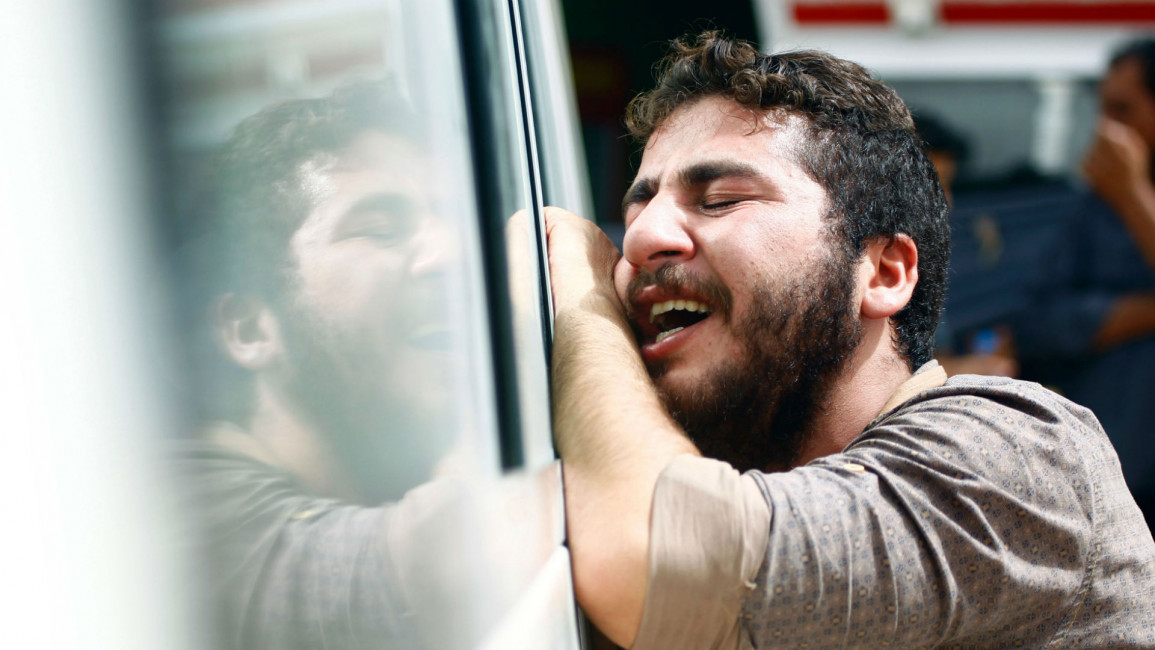IS bombing at Iraq's holy Shia city of Najaf
IS bombing at Iraq's holy Shia city of Najaf
Over a dozen Iraqis were killed when IS militant detonated a vehicle at a checkpoint in Najaf, a city revered by the country's Shia Muslim population.
2 min read
Shia majority Najaf has previously been targeted by al-Qaeda militants [Getty]
At least 16 Iraqis have been killed on when a car bomb exploded in Najaf on Sunday, a city key to Iraq's Shia identity.
The Islamic State group reportedly claimed responsibility for the attack through the Amaq news agency, and said five militants were involved in the raid.
Iraqi forces imposed tight security in fear of new attacks.
A source in the Iraqi interior ministry said that the bomb exploded at a checkpoint in Qadisiyah neighborhood, south-east of Najaf saying that the bombing killed three people and injured thirteen others.
He added that the majority of the dead and wounded were members of the security forces, cutting off all roads leading to the scene.
Iraqi forces imposed tight security measures in all districts in Najaf in anticipation of new attacks according to Haider Ghalibi, head of police in in area.
Ghalibi also denied reports he had to impose a curfew in the neighborhood of Qadisiya.
The attack came one day after two suicide bombers killed at least 28 people at a Baghdad market.
It was claimed by the Islamic State group, and was one of Iraq's bloodiest attacks in months.
Baghdad has seen near-daily attacks blamed on Islamic militants since 2003, but Najaf has been quieter in recent years.
During the height of unrest between Iraq's Shia and Sunni communities Najaf was a more frequent target of militants.
IS' precursor al-Qaeda in Iraq launched a series of bombings on the city's holy sites following the 2003 US-led invasion of Iraq.
One of the holiest sites in the city in the Imam Ali Mosque, where Ali, the first Shia Imam, is buried.
The Islamic State group reportedly claimed responsibility for the attack through the Amaq news agency, and said five militants were involved in the raid.
Iraqi forces imposed tight security in fear of new attacks.
A source in the Iraqi interior ministry said that the bomb exploded at a checkpoint in Qadisiyah neighborhood, south-east of Najaf saying that the bombing killed three people and injured thirteen others.
He added that the majority of the dead and wounded were members of the security forces, cutting off all roads leading to the scene.
Iraqi forces imposed tight security measures in all districts in Najaf in anticipation of new attacks according to Haider Ghalibi, head of police in in area.
Ghalibi also denied reports he had to impose a curfew in the neighborhood of Qadisiya.
The attack came one day after two suicide bombers killed at least 28 people at a Baghdad market.
It was claimed by the Islamic State group, and was one of Iraq's bloodiest attacks in months.
Baghdad has seen near-daily attacks blamed on Islamic militants since 2003, but Najaf has been quieter in recent years.
During the height of unrest between Iraq's Shia and Sunni communities Najaf was a more frequent target of militants.
IS' precursor al-Qaeda in Iraq launched a series of bombings on the city's holy sites following the 2003 US-led invasion of Iraq.
One of the holiest sites in the city in the Imam Ali Mosque, where Ali, the first Shia Imam, is buried.

![Trump's warm greeting to Netanyahu contrasted with Kamala Harris's critical reception [Getty]](/sites/default/files/styles/image_330x185/public/2024-07/GettyImages-2162908988.jpg?h=69f2b9d0&itok=OLc5dL88)
![The brutal assault on Khan Younis has killed dozens and displaced thousands more [Getty]](/sites/default/files/styles/image_330x185/public/2024-07/GettyImages-2162526709.jpg?h=d3eda8cf&itok=n5N-o8p5)
![Members of the Algerian delegation threw roses into the Seine [Getty]](/sites/default/files/styles/image_330x185/public/2024-07/GettyImages-2162980872.jpg?h=199d8c1f&itok=h_3o_TOL)